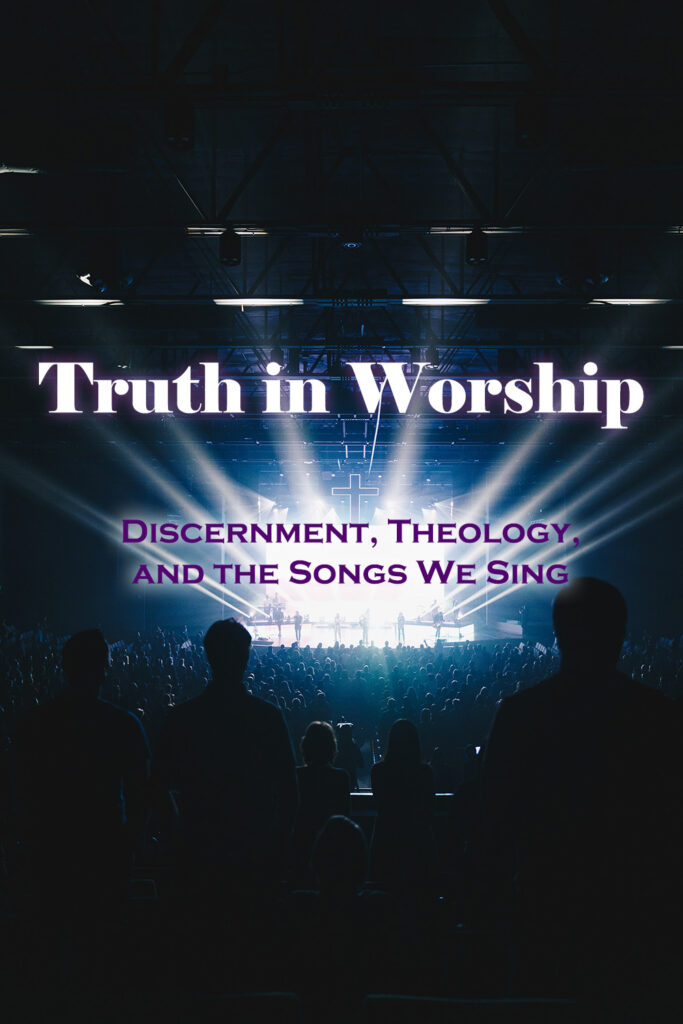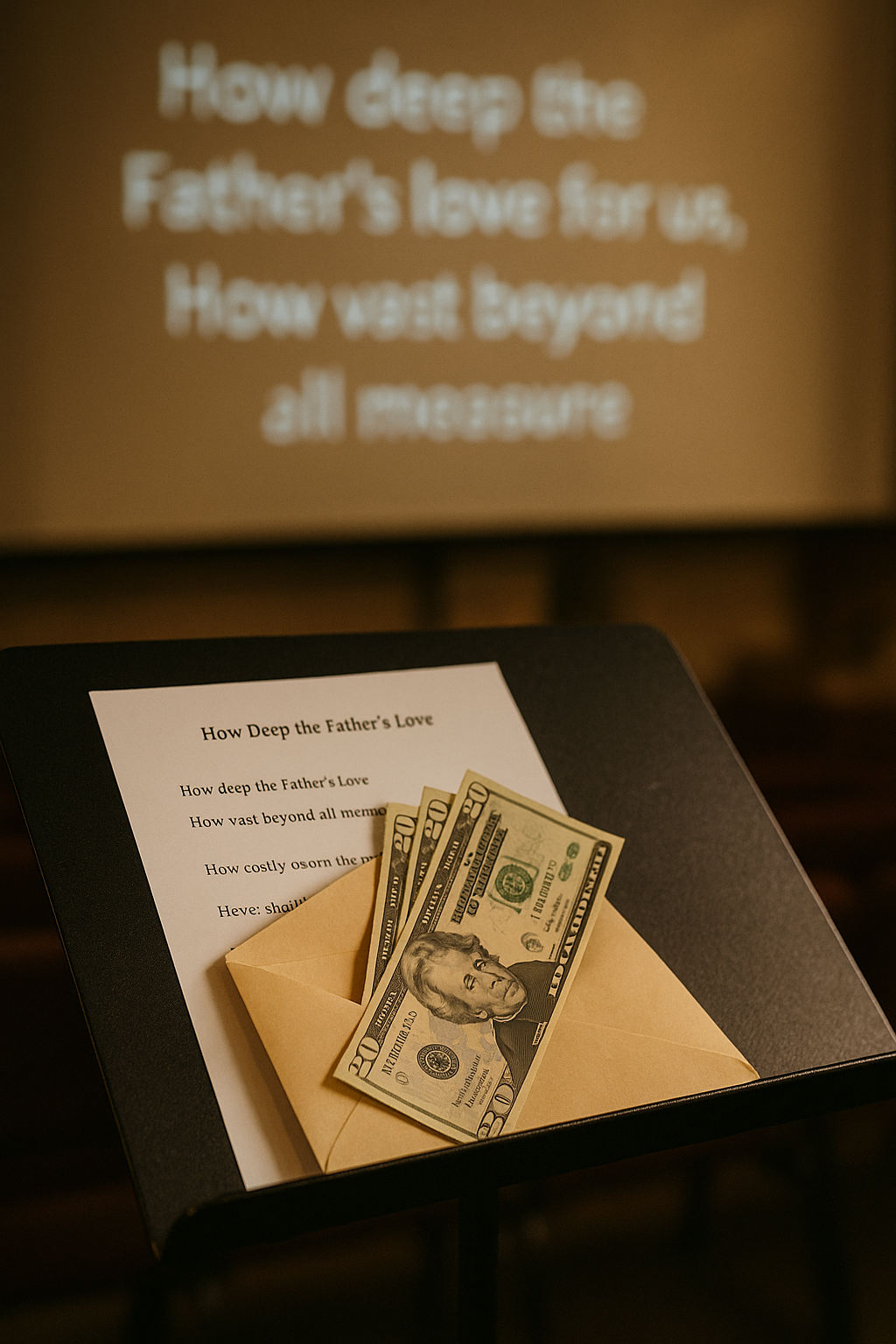⏱️ Estimated Reading Time: 22 min read
Why the Royalties to Bethel Church Matter
By Richard P Moore
After 10 years of detailed, thorough research into Bethel Church in Redding, California, I have concluded that I could never in good conscience recommend a single resource put out by Bethel Church. Not a book, not a podcast, not a sermon, not a conference, not even products sold in their Bethel online store. Their theological aberrations are to be found in nearly everything that they produce. If I cannot, in good conscience, recommend any of the myriad resources that Bethel Church puts out, why would I not feel the same about the music and the “worship” resources that they produce?
In this article I will demonstrate why the royalties to Bethel Church, Bethel Music, and their conglomerates matter, and not only matter, but keep the Bethel machine chugging along, allowing it to continue to purvey its particular form of aberrant, heterodox, and unorthodox theological perspectives, teaching, and practices to a global audience.
Bethel Church in Redding, California, is one of the most influential spiritual brands in the world today. Its reach extends far beyond Redding—into Spotify playlists, YouTube algorithms, polished conference stages, and monthly Bethel TV subscriptions. At the heart of this movement is not merely aberrant theology, an improper emphasis on revivalism, and a misplaced hunger for signs and wonders (Christ taught that an evil and adulterous generation seeks a sign Matthew 16:4; Mark 8:12; 12:39; Luke 11:29), but a sophisticated, monetized, and monopolistic media operation—one that thrives on copyright enforcement, emotional manipulation, a polished public relations image, and global influence.
In this article, I will give evidence that the exorbitant amount of revenue and royalties pouring into Bethel and its affiliates are not incidental and not innocuous. They are the result of deliberate strategy—a spiritual-industrial complex that converts their aberrant and heterodox theology into commerce and dominion doctrine into subscription. Bethel’s illegal copyright claims on critics, particularly lately as seen in famous YouTuber Mike Winger among other many smaller YouTubers like myself, is an illegal form of digital hijacking, wherein Bethel illegally seeks to suppress critique by making copyright claims on critics’ materials on YouTube. Bethel’s branding and licensing structures are not simply about protecting creative works; they are also about silencing critique, protecting revenue streams, and perpetuating a mystique of apostolic and prophetic anointing, built on discernable false teaching and false prophecy.
Heterodox and Unorthodox Theology Hiding in Plain Sight
By now, Bethel’s heterodox and precarious teachings have been exceedingly substantiated through public critique, by this publication, and via with many other books, podcasters, and by a plethora of evangelical critics that Bethel is at least heterodox and at worst theologically unorthodox—outside historic Christian Theological Orthodoxy (see appendix of resources). This point is often disputed that they stand outside of historical Christian orthodoxy, because their statements of faith on their websites seem to hold to Orthodoxy. However, the pattern of history in regard to false teaching, heresy, and aberrant movements is that those aberrant movements, and those heretics do not announce themselves as such.
Take Arias for example. In Church history he did not announce to the Church, “I am a false teacher. What I believe and teach is heresy, and you should avoid me.” No declared heretic in all of Church history, that I’m aware of, has ever said such a thing. Therefore, Bethel is following the pattern of history in not announcing themselves, but rather hiding under the guise of Christian Theological Orthodoxy by infiltrating theologically faithful congregations with the theological Trojan horse of their music brand.
But make no mistake, after years of looking into their theology, teachings, and practices at length, they do not align with their statements of faith as presented publicly. If heterodoxy and unorthodox views are hiding in plain sight, then the royalties they receive from the broader global Church are the revenue stream keeping them viable.
Why do these royalties matter? Because they point to a deeper concern: the commodification of Christ’s bride, the Church, into a branded experience where the heterodoxy and quite possible unorthodox false teaching is spread and empowered through the support of the global Church’s often unknowing financial support. And when critique or questions arise, they are punitively handled with algorithmic takedowns and copyright claims.
I have been involved in critique of Bethel for quite some time, as a YouTuber. I have become aware that easily a dozen other very large YouTubers have also had punitive copyright claims placed on their material for their critique. This shows that Bethel is not open to theological and biblical critique or answering questions. Bill Johnson, himself, in his book, When Heaven Invades Earth, has made it clear that he is not open to those who would critique their movement. More specifically, he is not open to critique of the beginnings of their movement, which he claims is the Toronto Blessing.[i] Instead they punitively attack anyone who would critique them.
Rather than reflect and repent from unorthodox teaching, theology, and practice, they punish those who would dare to critique them with frivolous and unlawful copyright claims, hamstringing content creators. Fair use laws in the United States allow for people to use other people’s content for critique, comment, and news reporting among other things.[ii] However, Bethel and many others in the NAR are not open to being critiqued, and therefore they ignore the law of the land—specifically “fair use laws.”
A Monetized Movement Masquerading as Evangelical
Bethel is not just a church. It is a global content network. Its music dominates Christian streaming platforms, its Schools of Supernatural Ministry are multiplying worldwide, and its sermons reach millions via YouTube (and other streaming platforms). Each of these arms—music, teaching, media—is revenue-producing. The result? A self-reinforcing economic ecosystem that feeds off spiritual hunger and translates it into subscription fees, merchandise, donations, and licensing rights. Despite Redding, California’s meager population of under 96,000, Bethel boasts 11,000 local members,[iii] transcending its role as a mere church to become a global movement.
Bethel’s influence extends through the Bethel School of Supernatural Ministry (BSSM), with an enrollment fluctuating between 3,000 to 5,000 students annually, drawing individuals from around the world. According to Bill Johnson, the senior leader, Germans comprise the largest nationality within BSSM,[iv] a fact that I confirmed during my 2020 visit. My interest grew years ago as to Bethel’s influence in Germany and Europe because their influence directly affects my missionary ministry in Germany. BSSM’s impact spreads further through its school planting initiative, aiding the establishment of similar institutions worldwide.[v] Bethel also encompasses various educational ventures and oversees seven satellite churches,[vi] solidifying its extensive reach within and far beyond California alone.
Bethel Music, an integral part of Bethel Church, holds immense global popularity. Its contemporary songs resonate across modern churches worldwide, including Germany, where they are frequently sung. With 5.05 million YouTube subscribers and videos garnering up to 50 million views, Bethel Music’s influence is undeniable. Brian Johnson, son of Bill Johnson and a prominent Bethel worship leader, recently shared his staggering Spotify streaming numbers on Instagram, totaling 192.4 million streams in 2023 alone.[vii] With royalties estimated at 0.3–0.5 cents per stream, Johnson’s potential revenue from Spotify alone would range between approximately $577,000 and $962,000. Note, these figures represent payments to rights holders rather than direct income to the artists themselves, yet they nevertheless highlight the significant financial royalties generated by Bethel artists. Noteworthy also is these estimates reflect only Spotify; it does not account for royalties from other major streaming services (iTunes, Amazon, etc.), underscoring how substantial Brian Johnson’s and other Bethel artists streaming revenue could have been in that year.
Bethel music albums, typically, after being released end up at the top of streaming charts, iTunes, Spotify, and they have even had a billboard number one chart, have been nominated for 28 Dove awards, two Grammy awards, and one Billboard music award (Jenn Johnson—1 Dove Award; Brian Johnson—1 Dove Award; Bethel Music—3 billboard nominations, and 4 Dove Awards).[viii] With 16 current Bethel artists on their label and 15 former artists who are all still involved in the music industry, their influence and reach are unmistakable.
These instances of their musical success highlight the revenue which is generated by their music. Another thing that generates revenue for Bethel Church is Christian Copyright Licensing International (CCLI). Data from September 2022 reveals Bethel’s dominance, with eight of the ten most widely used songs licensed by CCLI originating from Bethel-related churches or artists. Additionally, a recent study found that between 2010 and 2020, the majority of top CCLI songs came from Bethel and other New Apostolic Reformation (NAR)-aligned churches,[ix] shaping evangelical worship practices globally.[x] Bethel’s teachings, disseminated through conferences, music, books, and online platforms, impact millions of Christians worldwide, influencing theological perspectives and spiritual practices. However, potential theological errors or excesses within Bethel’s teachings can reverberate throughout the global Church, leading to confusion and division.
Take for instance, the song “Reckless Love”, by Cory Asbury. It was at one time extremely popular and won the GMA Dove award for the Song of the Year. The problem is that it describes God’s love as reckless. God is not reckless. Therefore, He cannot act recklessly, and neither is His love reckless. This is one simple example of how Bethel and their music artists smuggle in aberrant theology and teaching about God.
Should we make worship leaders differentiate between theological differences within Bethel Music? I would argue that disallowing Bethel Music would be a better option, because we make theologically untrained worship leaders decide what would or could be theologically unsound from Bethel music. Therefore, I recommend that churches and ministries disallow Bethel Music or their affiliates so that these tough theological decisions are not left to theologically untrained worship leaders. If we do this, we leave very difficult theological discernment challenges between what’s theologically solid and what is theologically dubious to untrained worship leaders. In all practicality, leaving them with very difficult theological decisions and circumventing elder/pastor governance of such theological decisions.
Bethel’s revenue impact extends beyond music, encompassing various ministries and initiatives. BethelTV, with an estimated 144,000 subscribers generating substantial revenue, offers a platform for spiritual content subscribers paying roughly $9.99 per month—before accounting for special events, one-time purchases, or premium upgrades. The pricing may seem innocuous, but multiplied by subscribers this is a mountain of recurring revenue. And that’s not counting premium content, event passes, and merchandise. This model of digital “revivalism” promotes a theology where access to spiritual power is mediated by subscription. This is pay-to-play Christianity. Those who take part are led to believe they are participating in a special stream of divine favor, healing, and other apostolic and prophetic coverings. It is emotional capitalism disguised as ecclesiology.
Bethel Church hosts numerous conferences throughout the year: “Open Heavens” conference, “School of the Prophets” conference, “Wonder Conference”, “Bethel Healing School”, “BraveCo Men’s Conference”, “Prophetic Conference”, and many other smaller conferences.[xi] Additionally, Bethel’s ministry, “SOZO”—another revenue stream—focuses on what is hindering your connection and reconnecting with each member of the Godhead.[xii] SOZO is gaining traction in Germany, German-speaking countries, and Europe at large.
Consider Bethel Music: its artists generate tens of millions of streams monthly. My previous estimate of Brian Johnson’s yearly Spotify streams doesn’t even account for iTunes, Amazon, YouTube, or licensing income from churches purchasing song usage rights through CCLI and other services. But perhaps the most telling aspect of this empire is its aggressive control over the narrative, as substantiated in the exposé by the Firm Foundation Podcast.[xiii]
Bethel has repeatedly filed copyright claims against critics—even when the material in question is protected clearly by fair-use laws for commentary. These are not random defensive actions. They are calculated efforts to suppress dissent while raking in ad revenue from videos that viewers assume are freely available. In this system, revival is no longer a sovereign work of the Spirit. It is a product—marketed, streamed, monetized, and litigated. And the pastors are not just shepherds, they are brand managers.
Lavish Leadership: Where the Money Goes
While many Bethel followers may assume that tithes and streaming royalties go toward missions or charitable efforts, the evidence suggests otherwise. Bethel’s leadership—especially in the music and teaching arms—live in considerable luxury.[xiv] From high-end homes and exorbitant speaking fees, to private travel and concert tours, the lifestyles of Bethel’s key figures resemble those of celebrities more than pastors. Brian Johnson’s public boasting about his streaming revenues only underscores the financial motivations behind much of Bethel’s content creation. The money created through all streams of revenue in Bethel Music and Bethel Church flow to the top of the apostolic and prophetic mountains in their structure. Landing in the main senior leaders’ laps. These leaders are the tip of the spear in relation to false teaching in the Bethel stratosphere.
Bethel is certainly a proponent of the prosperity gospel. This is seen most clearly in their offering declarations, made weekly before their offering is collected.[xv] And the book written by senior leader and prophet at Bethel, Kris Vallotton, Poverty, Riches and Wealth: Moving from a Life of Lack into True Kingdom Abundance[xvi] and the recently controversial appearance of Kenneth Copeland, a famous prosperity preacher, at Bethel.[xvii] The prosperity gospel would have us believe that our “health, wealth, and prosperity” were won for us by Jesus on the cross. Tell me, how could Jesus have won something for us that could lead to, as Paul says, temptation, a snare, or into many senseless and harmful desires that plunge people into ruin and destruction? Why would Jesus have accomplished something that is a “root of all kinds of evil”? Even worse, could Jesus have accomplished something for us that could eventually make us “wander away from the faith” and “pierce us with many pangs”? Impossible! Jesus has won for us on the cross our eternal redemption and propitiation; not health, wealth, or prosperity. Jesus is a good God. He would never win something for us that could lead to our destruction, ruin, or walking away from the faith.
As Paul warns in 1 Timothy 6:3–10:
If anyone teaches a different doctrine and does not agree with the sound words of our Lord Jesus Christ and the teaching that accords with godliness, he is puffed up with conceit and understands nothing… imagining that godliness is a means of gain… But those who desire to be rich fall into temptation, into a snare, into many senseless and harmful desires that plunge people into ruin and destruction. For the love of money is a root of all kinds of evils. It is through this craving that some have wandered away from the faith and pierced themselves with many pangs.
This “prosperity” is the condition afflicting Bethel’s leaders and their empire of excess. By their emphasis on prosperity, they certainly falsify and pervert the gospel.
The Business Model of Modern Apostolic and Prophetic Churches
The New Apostolic Reformation has restructured church into a global franchise, where worship leaders are content creators, sermons are ad-revenue opportunities, and “revival” is a product line. Through church-plants, music licensing, online schools, and publishing deals, Bethel and its affiliates are creating new beachheads for their “Apostolic” and “Prophetic” brand worldwide.
Local, historic genuine expressions of Christianity are replaced by Bethel’s identity—centered on Bethel’s distinct aesthetics, which often turn into doctrinal coups, where regular faithful and doctrinally sound churches are taken over by the Bethel paradigm. While the Christianese remains, Bethel’s methods mirror Silicon Valley and Hollywood more than the authentic early Church found in Acts 2.
Biblical and Ethical Evaluation
Scripture is not silent on such practices. The Apostle Paul warned against those who peddled the Word of God for profit (2 Corinthians 2:17). Jesus overturned the tables of those who turned the temple into a marketplace (Matthew 21:12–13). Peter rebuked Simon the Sorcerer for trying to buy the power of God (Acts 8:18–20). Bethel’s empire—built on royalties, monetization, and branding—is a modern equivalent. Its leaders fit the pattern of those who use godliness as a means of gain (1 Timothy 6:5). Bethel replaces truth with spin, silencing righteous judgment, devising legal schemes against fellow believers, and profiting from promises of their false brand of revival, healing, and spiritual power that are empty of any biblical substance.
Conclusion: Why the Royalties Matter
The royalties to Bethel Church (and its affiliates) matter because they reveal a deep spiritual problem. Not just the love of money, but the redefinition of ministry into a monetized enterprise. Not just greed, but control. Not just branding, but blasphemy. This is a call to discernment. A call to recognize when people peddle God’s Word (2 Corinthians 2:17). And it is a call to return to the simplicity and power of the true gospel—freely received, freely given (Matthew 10:18). Let the Church not be a franchise. Let Christ—not royalties—be the reason we gather, worship, and proclaim the truth.
Royalties to Bethel matter because your hard-earned dollars might go to support a heterodox and/or theologically unorthodox movement. Secondly, your streams, the singing in church, and your views on YouTube and will go to support the Bethel cash cow, keeping it afloat. Bethel would not gain royalties if there weren’t viewers, listeners, or those who purchased their materials. Thirdly, you might accidentally be drinking the theological poison mixed into the Kool-Aid and not know it. Fourthly, you might not be able to differentiate between the theological poison, and the truth because there is some truth mixed in with the poison. Fifthly, you might be unconsciously drawn in to the NAR and Bethel theology. You might be opening the door in your church or in your own life to aberrant and heterodox teaching. Sixthly, by listening, supporting, or giving royalty money to these leaders and teachers, “apostles”, and “prophets” in this movement, you are unknowingly spreading their “leaven” of false teaching and false prophecy. “A little leaven leavens the whole lump” (Galatians 5:9).
Arias was an early Church leader that taught, a form of heresy that was later condemned and coined as “Arianism.” This heresy taught that Jesus was not eternal and was the first born of the Father. “There was a time when he was not” was a phrase coined by Arias. Arianism was spread in that era through music, sea shanties, and jigs that were popular at the time. This phrase actually was part of a song that Arias wrote. It was because of Arias’ clever usage of music that his heresy (Arianism and its aberrations) took such a foothold in the early Church.
Athanasius was the Church father who opposed Arias. We actually know very little about Arias and what he taught. Here is quote taken from Athanasius’ opposing work, Against the Arians, in which he quoted Arian’s errant lyrics below:
God Himself then, in His own nature, is ineffable by all men.
Equal or like Himself He alone has none, or one in glory.
And Ingenerate we call Him, because of Him who is generate by nature.
We praise Him as Unoriginate because of Him who has an origin.
And adore Him as everlasting, because of Him who in time has come to be.
The Unoriginate made the Son an origin of things generated;
And advanced Him as a Son to Himself by adoption.
He has nothing proper to God in proper subsistence;
For He is not equal, no, nor one in substance with Him.[xviii]
Doxology is the form which Christians employ to worship God. Orthodoxy is the right, straight, or correct teaching of who God is and what He requires of man. Doxology affects orthodoxy, and vice versa. Neither Orthodoxy nor Doxology live in a vacuum. How, and by what means, and what resources we use to worship God affects what we believe about Him. If we use aberrant sources in our doxology, we will eventually have aberrant theology. As seen in the case of Arias, if you want to affect Orthodoxy change Doxology.
I recommend that churches stop singing Bethel Music immediately. It is a theological Trojan horse.[xix] in their book, Counterfeit Kingdom, Douglas Geivett and Holly Pivec argue in one whole chapter that Bethel Music and their subsidiaries are a great source of toxic worship music. Furthermore, they show how Bill Johnson, the Senior Leader at Bethel, has encouraged his worship leaders to imagine what the church should look like theologically in five years, and then write songs incorporating that specific theology so that people will “sing their way into it.” If that does not scare us or give us pause as to the intentions of Bethel Church, then nothing else will. They are trying to reshape the face of the Church. That’s why royalties to Bethel matter. They are reshaping the face of evangelicalism, and we are giving them our money to help them do it.
Appendix of Resources
Pivec, H., & Geivett, R. D. (2023). Reckless Christianity: The Destructive New Teachings and Practices of Bill Johnson, Bethel Church, and the Global Movement of Apostles and Prophets. Cascade Books.
Geivett, R. D., & Pivec, H. (2022). Counterfeit Kingdom: The Dangers of New Revelation, New Prophets, and New Age Practices in the Church. B&H Books.
Geivett, R. D., & Pivec, H. (2014). A New Apostolic Reformation? A biblical response to a worldwide movement. WEAVER BOOK COMPANY.
Hinn, C. W., Wood, Anthony G, & MacArthur, John. (2018). Defining deception: Freeing the church from the mystical-miracle movement.
Justin Peters Ministries (Director). (2024, February 23). My Open Challenge to Bill Johnson, Kris Vallotton and Bethel Church [Video recording]. https://www.youtube.com/watch?v=f78nDMj_bzw
Liesen, F. (2022). Bethel Church:New-Age-Synkretismus und die Suche nach einer evangelikalen Antwort. Glauben und Denken heute, 1(29), 18–36.
Liesen, F. (2022, July). Bethel Church: New Age Syncretism and the Quest for an Evangelical Response in Germany.
Mohler, A. (n.d.). The Briefing: Friday, December 20,2019 [Broadcast]. Retrieved September 30, 2022, from https://albertmohler.com/2019/12/20/briefing-12-20-19
Moore, R. P. (2017). Divergent Theology: An Inquiry Into the Theological Characteristics of the Word of Faith Third Wave Movement and The New Apostolic Reformation. CreateSpace Independent Publishing Platform.
Moore, R., P. (2023). The New Apostolic Reformation and Its Threat to Evangelicalism. Evangelical Review of Theology, 47(2), 133–145.
Oelze, A. (2023, March 1). Die Erweckung Europas in Eimeldingen. Die Erweckung Europas in Eimeldingen. https://www.ezw-berlin.de/publikationen/artikel/die-erweckung-europas-in-eimeldingen/
References:
[i] Johnson, B. (2003). When heaven invades earth: A practical guide to a life of miracles. Treasure House. (pp. 76 & 115-116).
[ii] 17 U.S. Code § 107—Limitations on exclusive rights: Fair use | U.S. Code | US Law | LII / Legal Information Institute. (n.d.). Retrieved July 27, 2025, from https://www.law.cornell.edu/uscode/text/17/107
[iii] Jones, Martyn Wendell. 2016. “Inside the Popular, Controversial Bethel Church.” ChristianityToday.Com. April 24, 2016. https://www.christianitytoday.com/ct/2016/may/cover-story-inside-popular-controversial-bethel-church.html.
[iv] “Vier Freunde – FCJG.de | Freie christliche Jugendgemeinschaft.” n.d. FCJG.de | Freie christliche Jugendgemeinschaft. Accessed April 16, 2024. https://www.fcjg.de/uekd-blog/83-burning-hearts/790-sprecher-rueckblick.
“Burning Hearts 2018 Conference on Pentecost – Lüdenscheid, Germany – FCJG.de | Freie Christliche Jugendgemeinschaft.” n.d. FCJG.de | Freie Christliche Jugendgemeinschaft. Accessed April 16, 2024. https://www.fcjg.de/en/burning-hearts-2018-conference?id=544.
[v] “BSSM School Planting – Equipping School Leaders.” n.d. Accessed April 11, 2024. https://bssm.net/schoolplanting/.
[vi] “Churches | Bethel.” n.d. Accessed April 15, 2024. https://www.bethel.com/churches.
[vii] “Brian Johnson (@brianjohnsonm) • Instagram Photos and Videos.” n.d. Accessed March 27, 2024. https://www.instagram.com/p/C0jf7IMM2TE/.
[viii] Jenn Johnson—Wikipedia. (n.d.). Retrieved July 27, 2025, from https://en.wikipedia.org/wiki/Jenn_Johnson
Brian Johnson (Bethel Music singer)—Wikipedia. (n.d.). Retrieved July 27, 2025, from https://en.wikipedia.org/wiki/Brian_Johnson_(Bethel_Music_singer)
Bethel Music—Wikipedia. (n.d.). Retrieved July 27, 2025, from https://en.wikipedia.org/wiki/Bethel_Music
[ix] “CCLI — Christian Copyright Licensing International.” n.d. CCLI – US. Accessed September 22, 2022. https://us.ccli.com/.
[x] Service, Bob Smietana-Religion News. 2023. “How Bethel and Hillsong Took Over Our Worship Sets.” News & Reporting. April 12, 2023. https://www.christianitytoday.com/news/2023/april/bethel-hillsong-worship-sound-christian-research.html.
[xi] “Featured Events | Bethel.” n.d. Accessed April 15, 2024. https://www.bethel.com/events.
[xii] “About Sozo.” n.d. Bethel Sozo. Accessed April 11, 2024. https://www.bethelsozo.com/about.
[xiii] (3) Bethel’s Copyright Claims??? – YouTube. (n.d.). Retrieved July 27, 2025, from https://www.youtube.com/watch?v=NEr-vv_AofY&list=PLCZFj_Ex2zmrBV-wU_vYUbL06C7KLgG1n
[xiv] (5) How Much MONEY Do Johnson and Vallotton Really Make? – YouTube. (n.d.). Retrieved July 27, 2025, from https://www.youtube.com/watch?v=MNah8XMQ3eA&t=7s
[xv] Offering Readings | Bethel. (n.d.). Retrieved July 27, 2025, from https://www.bethel.com/offering-readings
[xvi] Vallotton, K., & Franklin, J. (2018). Poverty, Riches and Wealth: Moving from a Life of Lack into True Kingdom Abundance. Chosen Books.
[xvii] (3) Bethel Church Service | Kenneth Copeland Sermon | Worship with Peter Mattis—YouTube. (n.d.). Retrieved July 27, 2025, from https://www.youtube.com/watch?v=ZhCYdgqh1B4
[xviii] Athanasius. (n.d.). Against the Arians (Oration 1, Appendix to Epistle 2, § 15; Deposition of Arius). In Newman Reader: Works of St. Athanasius. Retrieved July 27, 2025, from [Newman Reader website]
[xix] Geivett, R. Douglas, and Holly Pivec. 2022. Counterfeit Kingdom: The Dangers of New Revelation, New Prophets, and New Age Practices in the Church. Nashville, TN: B&H Books. (pp. 139-157).




